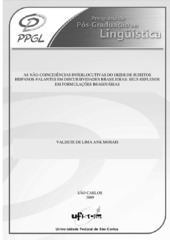| dc.contributor.author | Morais, Valdete de Lima Ank | |
| dc.date.accessioned | 2016-06-02T20:25:02Z | |
| dc.date.available | 2009-08-11 | |
| dc.date.available | 2016-06-02T20:25:02Z | |
| dc.date.issued | 2008-02-11 | |
| dc.identifier.citation | MORAIS, Valdete de Lima Ank. As não-coincidências interlocutivas do dizer de sujeitos hispanos-falantes em discursividades brasileiras : seus reflexos em formulações imaginárias. 2008. 127 f. Dissertação (Mestrado em Ciências Humanas) - Universidade Federal de São Carlos, São Carlos, 2008. | por |
| dc.identifier.uri | https://repositorio.ufscar.br/handle/ufscar/5669 | |
| dc.description.abstract | Based upon French Discourse Analysis, our purpose in this study is bring and analyze discursive sentences produced by Spanish native speakers, symptoms of their enunciative projections, imaginary and discursive memories, in relation to their concepts, impressions, allusions concerning Portuguese language and Spanish language, in situations of immersion and interlocution in Brazilian contexts. We start from Serrani-Infante s (1998) formulations, that the subject, when speaking another language, becomes part of the identification process in the target language discursive formations that build up the happening of enunciative positions. In order to realize this study it is necessary to understand the insertion of the Spanish native speaker in Brazilian Portuguese language in the immersion process as a subjective process (SERRANI,
1997b), which requires the subjectivity from the Spanish native speaker and will submit him to inscribe himself in different enunciative positions, missteps, displacements and
transference motions (CELADA, 2004). Thus, we understand that part of these enunciative positions is associated with the Spanish native speaker s mother tongue, with their own language positions, and that many of them are brought up in the encounter with the foreign language, leading the subject to conflict situations generated by the distinct understanding of reality linked to those two languages. These conflict
situations, concerning the processes of production and attribution of meanings by native speakers of Spanish as they enunciate in Brazilian Portuguese language, constitute the
focus of this study. | eng |
| dc.format | application/pdf | por |
| dc.language | por | por |
| dc.publisher | Universidade Federal de São Carlos | por |
| dc.rights | Acesso Aberto | por |
| dc.subject | Lingüística | por |
| dc.subject | Ensino - aprendizagem | por |
| dc.subject | Língua materna | por |
| dc.subject | Memória | por |
| dc.subject | Identificação | por |
| dc.subject | Sujeito hispano-falante | por |
| dc.subject | Representações | por |
| dc.subject | Spanish native speaker | eng |
| dc.subject | Mother tongue | eng |
| dc.subject | Representation | eng |
| dc.subject | Memory | eng |
| dc.subject | Identification | eng |
| dc.title | As não-coincidências interlocutivas do dizer de sujeitos hispanos-falantes em discursividades brasileiras : seus reflexos em formulações imaginárias | por |
| dc.type | Dissertação | por |
| dc.contributor.advisor1 | Viana, Nelson | |
| dc.contributor.advisor1Lattes | http://lattes.cnpq.br/6252579012192711 | por |
| dc.description.resumo | A partir da Análise de Discurso de linha francesa, nossa proposta de pesquisa foi elicitar e analisar seqüências discursivas produzidas por sujeitos falantes nativos de espanhol, sintomas de suas projeções imaginárias e memórias discursivas em jogo, em relação às suas concepções, impressões, alusões, no que concerne à língua portuguesa e à língua espanhola, em situação de interlocução, imersos na língua e na cultura do brasileiro. Partimos de formulações de Serrani-Infante (1998), de que o sujeito, ao tomar a palavra
em outra língua, inscreve-se em processos de identificação em formações discursivas da língua alvo que constituem o acontecimento de posições enunciativas. Para realizarmos
este estudo foi necessário entender o processo de inscrição do sujeito hispano-falante na língua do brasileiro no processo de imersão como um processo subjetivo (SERRANI, 1997b), que solicitará a subjetividade do sujeito hispano-falante e o submeterá a circular por diferentes posições enunciativas, a deslizes, a deslocamentos e a movimentos transferenciais (CELADA, 2004). Dessa forma, entendemos que parte dessas posições enunciativas estão ligadas ao âmbito da língua materna do sujeito hispano-falante, a posições próprias de sua língua materna, e muitas delas serão trazidas à tona pelo
encontro com a língua estrangeira, e levam o sujeito a situações de confronto entre as formas de recortar o real dessas duas línguas. São estas as situações que constituíram o objeto de estudo no processo de produção e atribuição de sentidos por parte de sujeitos hispânicos ao enunciarem na língua portuguesa. | por |
| dc.publisher.country | BR | por |
| dc.publisher.initials | UFSCar | por |
| dc.publisher.program | Programa de Pós-Graduação em Linguística - PPGL | por |
| dc.subject.cnpq | LINGUISTICA, LETRAS E ARTES::LINGUISTICA | por |
| dc.contributor.authorlattes | http://lattes.cnpq.br/9571291100100998 | por |
